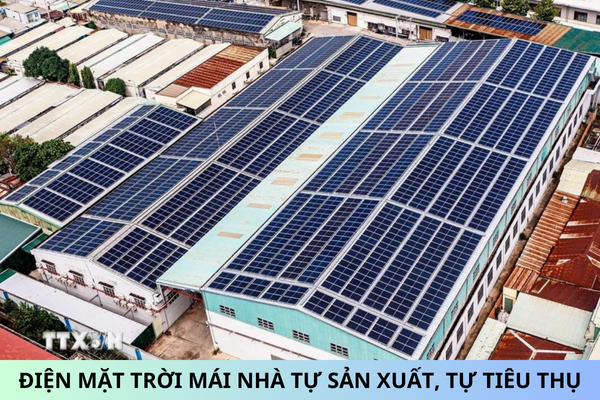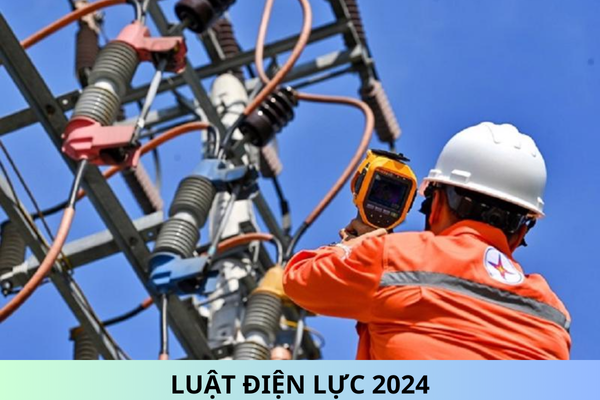09 policies to encourage the development of self-produced, self-consumed rooftop solar power in Vietnam
What is rooftop solar power?
Based on Article 3 of Decree 135/2024/ND-CP:
Article 3. Explanation of Terms
In this Decree, the following terms are understood as follows:
- Rooftop solar power is electricity produced from photovoltaic panels based on the principle of converting solar energy into electrical energy, through a structural arrangement installed on the roof of a building, connected with electrical equipment, and serving directly for power generation activities.
- Self-produced, self-consumed electricity is electricity produced and consumed by an organization or individual to primarily serve the needs of that organization or individual.
[...]
Thus, rooftop solar power is electricity produced from photovoltaic panels based on the principle of converting solar energy into electrical energy through a structural arrangement intended to be installed on the roof of a building, connected with electrical equipment, and serving directly for power generation activities.

09 policies to encourage the development of self-produced, self-consumed rooftop solar power in Vietnam(Image from the Internet)
09 policies to encourage the development of self-produced, self-consumed rooftop solar power in Vietnam
Based on Article 8 of Decree 135/2024/ND-CP, the regulation provides 09 policies encouraging the development of self-produced, self-consumed rooftop solar power as follows:
[1] Organizations and individuals installing self-produced, self-consumed rooftop solar power are exempted from electricity operation permits and have no limitation on installation capacity in the following cases:
- Not connected to the national power system
- Installing reverse power protection equipment into the national power system
- Households and individual residences developing self-produced, self-consumed rooftop solar power with a capacity below 100 kW.
[2] Organizations and individuals installing self-produced, self-consumed rooftop solar power with an installation capacity of 1,000 kW and above and selling surplus electricity into the national power system, must conduct procedures for power planning and request the issuance of electricity operation permits in accordance with the law.
[3] Self-produced, self-consumed rooftop solar power enjoys tax incentives under the current tax laws.
[4] Reduction of administrative procedures for self-produced, self-consumed rooftop solar power according to current specialized laws.
[5] Construction projects with self-produced, self-consumed rooftop solar power are not required to adjust, supplement energy land and functions as stipulated by law.
[6] Self-produced, self-consumed rooftop solar power of households, individual residences; offices and works identified as public assets are considered technology equipment attached to a construction work.
[7] Self-produced, self-consumed rooftop solar power connected to the national power system falls within the planning scale, implementation plan, and self-produced, self-consumed rooftop solar power connected to the national system for households and individual residences with capacities below 100 kW can sell unsold residual power back to the national grid but not exceeding 20% of the actual installed capacity as follows:
- Vietnam Electricity Group pays organizations and individuals for the residual electricity output sent to the national grid but not exceeding 20% of the actual installed capacity.
- The purchase price of excess electricity sent to the national grid is equivalent to the average market power price of the previous year as published by the electricity and power market operating unit to ensure appropriate encouragement during different development periods of the national power system.
- Self-produced, self-consumed rooftop solar power installed on roofs of office buildings or works defined as public assets does not include the sale of residual power output.
[8] Households and individual residences developing self-produced, self-consumed rooftop solar power are exempted or not required to adjust business licenses.
[9] Encouraging organizations, individuals to independently decide to install Battery Energy Storage Systems (BESS) to ensure safe and stable operation of the power system.
What are acts against regulations in the development and operation of self-produced, self-consumed rooftop solar power in Vietnam?
Based on Article 5 of Decree 135/2024/ND-CP, the acts against regulations in the development and operation of self-produced, self-consumed rooftop solar power in Vietnam include:
- Development of self-produced, self-consumed rooftop solar power not conforming with the regulations.
- Construction, installation, operation of capacity exceeding the capacity announced or certified by competent authorities for self-produced, self-consumed rooftop solar power connected to the national power system.
- Organizations and individuals failing to comply with the dispatch orders from the power system dispatching levels.










